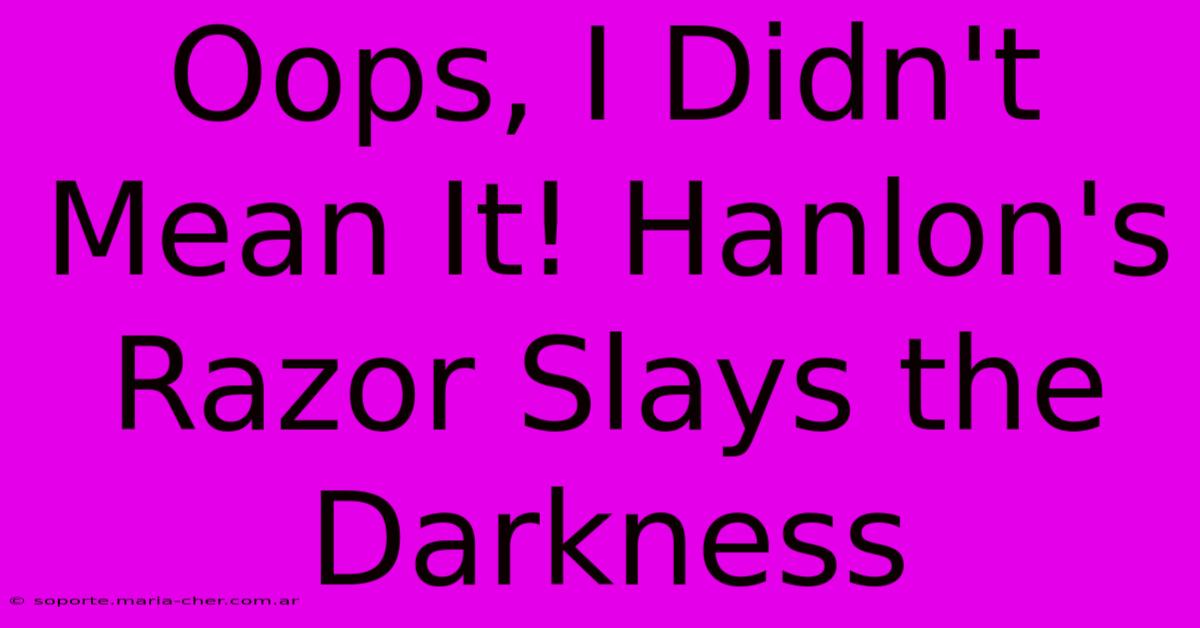Oops, I Didn't Mean It! Hanlon's Razor Slays The Darkness

Table of Contents
Oops, I Didn't Mean It! Hanlon's Razor Slays the Darkness
We've all been there. That moment when you see someone do something seemingly inexplicable, something frustrating or even hurtful. Immediately, our minds jump to conclusions: They did it on purpose. They're out to get me. But before you unleash your inner fury, consider Hanlon's Razor. This simple yet powerful principle can save you a lot of unnecessary anger and misunderstanding.
Understanding Hanlon's Razor: A Simple Concept with Profound Implications
Hanlon's Razor is concisely stated as: "Never attribute to malice that which is adequately explained by stupidity." In essence, it encourages us to consider the possibility of incompetence or simple error before assuming deliberate ill-intent. It's not about excusing bad behavior, but rather about approaching situations with a more nuanced and charitable perspective.
This principle cuts through the darkness of assumption, reminding us to:
- Examine the evidence: Before leaping to conclusions about someone's motives, take a step back and examine the facts. Was there a clear intention, or could the outcome have been the result of a mistake, oversight, or simple lack of knowledge?
- Consider alternative explanations: Often, multiple explanations are possible. Don't immediately settle on the most negative one. Brainstorm alternative scenarios that don't involve malice.
- Practice empathy: Put yourself in the other person's shoes. Think about their perspective, their limitations, and the pressures they might be facing. This helps foster understanding and reduces the likelihood of misinterpreting their actions.
Why is Hanlon's Razor So Important?
In our increasingly interconnected world, misunderstandings can have far-reaching consequences. Assuming malice where none exists can lead to:
- Damaged relationships: Unfounded accusations and anger can destroy trust and create lasting rifts between individuals and organizations.
- Unnecessary conflict: Jumping to conclusions fuels conflict, wasting time and energy that could be better spent resolving issues constructively.
- Missed opportunities: Prejudice and misjudgment can blind us to potential collaborations and positive interactions.
- Increased stress: Constantly suspecting ill-intent creates a stressful and negative environment, impacting both mental and physical well-being.
Applying Hanlon's Razor in Everyday Life
Hanlon's Razor isn't just a philosophical concept; it's a practical tool for navigating everyday life. Consider these examples:
- The late email: Instead of assuming your colleague intentionally ignored your request, consider that they might be overwhelmed, experiencing technical difficulties, or simply forgot.
- The rude comment: Before assuming someone is deliberately trying to be mean, consider if they might be stressed, having a bad day, or misinterpreting the situation.
- The missed deadline: Instead of assuming laziness, consider that unexpected circumstances or lack of resources might be to blame.
By applying Hanlon's Razor, you'll cultivate a more understanding and tolerant approach to life, reducing conflict and fostering healthier relationships.
Beyond Personal Interactions: Hanlon's Razor in a Larger Context
Hanlon's Razor's applicability extends beyond personal interactions. In larger contexts such as politics, business, and social movements, understanding that incompetence can be a significant factor helps to avoid overly simplistic and potentially harmful narratives. It encourages a more nuanced analysis of complex situations, leading to more effective solutions.
Conclusion: Shaping a More Understanding World
Hanlon's Razor offers a valuable lens through which to view the world. By prioritizing the principle of charity and considering the possibility of simple error before assuming malice, we can build stronger relationships, reduce conflict, and create a more understanding and compassionate environment for ourselves and others. So, the next time you find yourself tempted to assume the worst, remember Hanlon's Razor – and let it slay the darkness of unwarranted suspicion. You might be surprised at the positive outcomes.

Thank you for visiting our website wich cover about Oops, I Didn't Mean It! Hanlon's Razor Slays The Darkness. We hope the information provided has been useful to you. Feel free to contact us if you have any questions or need further assistance. See you next time and dont miss to bookmark.
Featured Posts
-
Unveiling The Secrets The Ultimate Guide To Cd Label Printers For Perfectionists
Feb 11, 2025
-
Ring Size Secrets Revealed Unlock The Perfect Fit For Your Monica Vinader Masterpiece
Feb 11, 2025
-
The Ultimate Guide To Chain Command Empowering Teams For Success
Feb 11, 2025
-
Ist O Or I Ll Yeen S O Oo I I Ll Yeen
Feb 11, 2025
-
Spelling Mastery Unlock The Doors To Literary Excellence
Feb 11, 2025
